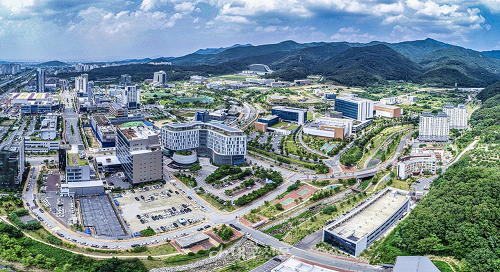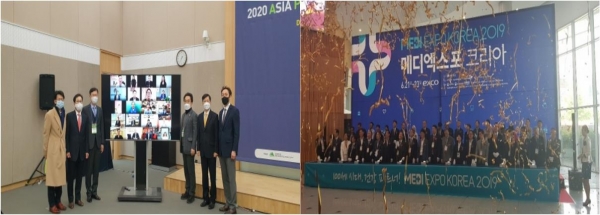Daegu's Medical-Driven Transformation
From COVID-19 Control to High-Tech Innovation with Medi-city Daegu Council
- Medi-city Daegu Council (MDC)
- COVID-19
- high-tech medical complex
- medical technology
- Daegu
Since 2005, Daegu has been heading to be a medical-care-centered city jointly with the public and private sectors. In 2009, the city had presented a joint brand of local medical institutions, "Medi-city Daegu," which later achieved the grand prize of South Korea's most representative brand for six times in a row. Based on this, Daegu had shown successful prevention and control in the first outbreak of COVID-19, raising the status of "K-prevention." The efforts and role of the Medi-city Daegu Council (MDC), a public-private governance organization, played a key part in this. In response, Health Kyunghyang prepared a special series of articles about Medicity Daegu Council. <Editor's Note>

Daegu wisely crushed the first spread of the COVID-19 in the city. The city had settled drive-through screening stations and residential treatment centers, which are considered standard models for the COVID-19 control. This is evaluated as a result of continuous exchanges between medical organizations in the city.
The "Medi-city Daegu Council (MDC, AKA Daegu Medical Tourism Council)," a medical consultative body in Daegu, held an urgent meeting the day after the 31st super-spreader came about. As a result, Keimyung University Daegu Dongsan Hospital was designated as a regional hub hospital. The city overcame COVID-19 through conducting campaigns and appealing to citizens to follow the guidelines. Currently, Daegu is preparing a new leap forward to prepare for the post-COVID era.
■Preparation for post-COVID with a high-tech medical complex
Daegu is preparing a long-term plan in preparation for the continued outbreak of infectious diseases. As the city has experienced the central government’s limited support amidst the COVID-19 pandemic, it aims to establish a strategy that can prevent the disease only by resources in the Daegu area in the future.
How Daegu was able to complete the disease control with only the local resources was because of the existence of the "High-tech Medical Complex (AKA Medivalley)." In 2009, the city announced that it would host the complex. However, it was hard to attract businesses due to cynical public opinion in the beginning. In response, the Medicity Daegu Council rolled up its sleeves for the medical companies to move in.
MDC promoted major medical policies and collaboration projects with various hospitals and increased the competitiveness of medical institutions. Also, it established the state-run Korea Brain Research Institute, the Korean Medicine Application Center of the Korea Institute of Oriental Medicine, and the 3D Convergence Technology Center. MDC is now working on various projects such as the Advanced Medical Genomics Research Center and the Laboratory Animal Resources Bank.
Four years after the technological transfer of the bio-information acquisition unit and monitoring system in 2015, the New Drug Development Center, one of the projects, has transferred seven technologies and secured 12 new drug pipelines such as dementia, high blood pressure, diabetes, and anemia.
A total of 144 medical companies—including medical devices, pharmaceuticals, and bio—had been invited to the Medivalley, and 130 companies finished moving in. The reason for the amplified increase in the number of companies moving in is because they can receive MDC’s support from the approval and change process of moving-in to commercialization and overseas ventures.
Core research facilities such as the communication center, Medical Device Development Center, Laboratory Animal Center, and Drug Manufacturing Center in Medivalley also played a part. With the complex revitalizing, Daegu’s economic power has also increased. According to an analysis of 130 companies that moved into the complex, 2,719 employees were hired last year, a 2.6-fold increase from 2015.
Cha Soon-do, chairman of MDC, said, "Medivalley is carrying out one-stop support projects for small and medium-sized companies in Korea, all the way from R&D to commercialization. MDC was the nation's first public institution to had acquired GMP certification in 2017, and it is now playing the role of assisting clinical trials, manufacturing, and analyzing for the companies."

■Medi Expo, a venue for interchanges with overseas medical professionals
MDC is holding various events for the development of local health care. Among them, the Medi Expo and the Asia Pacific Anti-Aging Conference (APAAC) are widely known.
Medi Expo is the largest health and medical exhibition in non-metropolitan areas and is conducting medical technology exchanges through various booths such as ▲global medical travel summit ▲medical tourists’ night ▲overseas buyers’ Daegu medical tourism fam tour ▲ business meeting for overseas buyers (B2B).
In Korea, Daegu regional hub hospitals—Kyungpook National University Hospital, Daegu Catholic University Medical Center, Yeungnam University Medical Center, Keimyung University Dongsan Medical Center, and Woman Medipark hospital—and numerous medical-industrial businesses participate in the Expo, and the hospitals are now presenting big data linked-AI technologies in conjunction with Industry 4.0. In particular, about 25 countries such as China, Russia, Mongolia, and Vietnam visited the export conference, a bridgehead for revitalizing the local medical industry and entering the global market.
This year, Medi Expo organized an online and offline counseling center for local medical companies that had trouble exploring overseas markets due to COVID-19, providing free translation and video solutions. Also, it conducted online consultations by discovering and pre-matching influential overseas buyers. In the end, 30 local medical companies participated in 245 export consultations with 68 foreign buyers from nine countries—China, Vietnam, and the Middle East—resulting in 48 million dollars for consultation and 20 million dollars for contract advancement.
The Asia Pacific Anti-Aging Conference (APAAC) is a highly reliable international academic event approved by the Korea Medical Association and designated by the Korea Tourism Organization as one of the four major K-Conventions.
The APAAC arranges various events, including an online academic event on anti-aging to train overseas doctor trainees and a consultation on the export of medical equipment and cosmetics companies through online industrial exhibitions.
In 2020, to prevent the spread of COVID-19, the advanced ICT conference system was actively utilized, and contact-free participation was required for the conference. The training sessions were aired live in Chinese and English for doctors from 15 countries around the world.
This time, on behalf of K-Beauty, one of the attention-grabbing topics around the world, technical training in medical fields—dermatology, plastic surgery, hair transplantation, and dentistry of which Daegu boasts—and online business consultations of local medical companies were held. MDC added a special session about COVID-19 prevention and control to prepare for the infectious disease in our daily life.
Min Pok-kee, head of the Medical Tourism Industry Committee of the MDC, said, "We are grateful that more than 800 people from 19 countries attended the conference despite the transition from offline to online due to the pandemic. We will continue to put more effort into promoting the related medical industry with the local medical community in the center and sharing Daegu's excellent medical technology."
